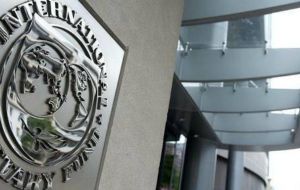MercoPress. South Atlantic News Agency
Latam and Caribbean forecasted to contract 0.5% in 2016, worst two-year since 1982, says IMF
 The region will be weighed down this year by shrinking economies in Brazil , Venezuela and Argentina.
The region will be weighed down this year by shrinking economies in Brazil , Venezuela and Argentina.  Brazil is seen posting a 3.8% contraction, Argentina is on course for 1% shrinkage, Mexico and Chile are expected to grow modestly, at 2.4% and 1.5% respectively.
Brazil is seen posting a 3.8% contraction, Argentina is on course for 1% shrinkage, Mexico and Chile are expected to grow modestly, at 2.4% and 1.5% respectively.  IMF blames “weak external demand, further declines in commodity prices, volatile financial conditions and ... some important domestic imbalances and rigidities”
IMF blames “weak external demand, further declines in commodity prices, volatile financial conditions and ... some important domestic imbalances and rigidities” Latin America and the Caribbean will post an overall 0.5% economic contraction in 2016, the International Monetary Fund forecast in its latest report, capping the region's worst two-year period since the 1982 debt crisis. But the IMF said the region is expected to rebound to 1.5% growth in 2017, avoiding the “lost decade” phenomenon that marked the 1980s.
The region will be weighed down this year by shrinking economies in Venezuela, Brazil and Argentina.
While Brazil is seen posting a 3.8% contraction this year and Argentina is on course for a 1 percent shrinkage, Mexico and Chile are expected to grow modestly, at 2.4% and 1.5% respectively.
The report blames “weak external demand, further declines in commodity prices, volatile financial conditions and ... some important domestic imbalances and rigidities” as common factors for the region's poor performance.
The IMF predicts that Argentina should return to growth in 2017, and Brazil's economy should stop contracting by then. But Brazil's volatile political scene, including an effort to impeach President Dilma Rousseff, could play a role.
The report warns that “a further deterioration of the situation in Brazil could lead to a sudden re-pricing of regional assets, reduced demand for exports among trading partners in the region and an increase in perceived risk.”
The exception is expected to be Venezuela. The report said the region's most troubled economy contracted by 3.9% in 2014, by 5.7% in 2015 and is expected to shrink by an astonishing 8% in 2016. Venezuela could trim its GDP contraction to 4.5% in 2017, but the country's economy is being punished by an energy crisis, spiraling inflation, shortages and deep political divisions.
Venezuela began imposing a four-hour daily blackout around the country this week to save power. And on Tuesday, President Nicolas Maduro announced that millions of officials will now work only Mondays and Tuesdays, taking the rest of the week off in a bid to save electricity.
Latin America and the Caribbean posted a collective 0.1% contraction in 2015. The IMF report said that “masks the fact that many countries continue to grow, modestly but surely, whereas a small number of economies — representing about half of the region's economy — face recession largely as a result of domestic factors.”




Top Comments
Disclaimer & comment rulesCommenting for this story is now closed.
If you have a Facebook account, become a fan and comment on our Facebook Page!